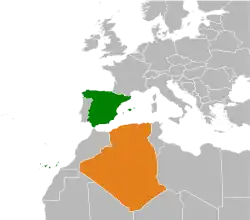Algeria–Spain relations
Algeria and Spain are full members of the Union for the Mediterranean.
 | |
Spain |
Algeria |
|---|---|
Unlike those of Spain with Morocco, Algerian-Spanish relations are not strained by a direct territorial dispute; there have been however discrepancies over the approach to the Western Sahara conflict.[1]
History
Precedents
Much of the territories of current-day Spain and Algeria were part of polities such as the Roman Empire or the Arab Caliphates.
In the 16th century, the Hispanic Monarchy and the Ottoman Empire vied for hegemony in North Africa, including current-day Algeria. The former captured in 1510 the rock of Algiers and held it for brief spell before being expelled by Hayreddin Barbarossa in 1529. The Zayyanid Kingdom of Tlemcen received protection from Charles V in exchange for parias, allowing the local ruler to remain in power until the 1555 Ottoman conquest.[2]
The Spanish Monarchy exerted control of Oran (1509–1708; 1732–1792) and the neighbouring port of Mers El Kébir for much of the early modern period.
History of modern relations
The Francoist dictatorship officially recognized Algeria as a sovereign state in 1962 and proceeded to appoint an ambassador.[3] Spain's bilateral relations with the Algerian republic, which were not good during Francoism,[4] would later experience a crisis in 1977–1978, when Algeria—cut off from the 1975 Tripartite Madrid Accords on the transfer of the administration of Western Sahara—came to provide instrumental support to the Canary Islands Independence Movement,[5] as well as to Sahrawi nationalism.[6]
The two countries signed a treaty of friendship, good neighbourliness and cooperation on 8 October 2002 in Madrid.[7][8] The two states cooperate on anti-terrorism issues.[7] The triangular balance between Algeria, Morocco and Spain influences the Spanish position on the conflict of Western Sahara; Algeria is committed to the referendum on self-determination, while calling for a stronger commitment from Spain on this on the basis of the latter's "historical responsibility".[9]
Both countries reinforced ties in 2013.[10] Algeria and Spain positioned themselves as important partners in 2015,[11] remaining linked "with strong relations" as of 2017.[12]
In March 2022, following a letter made public sent by Spanish Prime Minister Pedro Sánchez to King Mohamed VI of Morocco in which he assured that the proposal for an autonomy regime for Western Sahara that Morocco made in 2007 is the "most serious, realistic and credible" proposal for the resolution of the conflict, and the confirmation by the Spanish Minister of Foreign Affairs, José Manuel Albares that showed his confidence that there would be no retaliation for this turn by Algeria, the Algerian government called its ambassador, Saïd Moussi, in Spain to consultations.[13][14][15][16] The content of the letter and the change in the position of the Spanish government in the conflict of the Western Sahara was rejected by the rest of Spanish political parties, including Unidas Podemos, the minor member of the government coalition.[17]
In April 2022, Abdelmadjid Tebboune said "we have very strong ties with the Spanish state, but the head of government [Pedro Sanchez] broke everything," before assuring that Algeria would "never renounce its commitments to ensure the supply of gas to Spain whatever the circumstances".[18]
On 9 June 2022, as a result of the new Spanish position regarding Morocco and the Western Sahara, Algeria decided to suspend the friendship and cooperation treaty that united the two nations[19][20] Hours later, there were news reports that Algeria was suspending foreign trade with Spain.[21] Spain, for its part, is studying denouncing Algeria to the European Union[22] Brussels was "extremely concerned" said EU foreign affairs spokeswoman Nabila Massrali, "We would ask the Algerian party to take another look at that decision", she added.[23]
On 10 June 2022 José Manuel Albares travelled to Brussels to raise the issue and find a way to resolve the row with Algeria.[24] "The EU is ready to stand up against any type of coercive measures applied against an EU Member State," EU foreign policy chief Josep Borrell and European Commission Vice President Valdis Dombrovskis said in a joint statement.[25] Algeria replied through the voice of its diplomatic representation in Brussels, "the Algerian Commission to the European Union deplores the haste with which the European Commission reacted without prior consultation or any verification with the Algerian government", adding that "regarding the alleged measure by the government to stop current transactions with a European partner, it only exists in the minds of those who claim it and those who are eager to stigmatize it."[26]
On 11 June 2022 the department of Ramtane Lamamra declared in a press release that the decision to suspend the Treaty of Friendship responds to "legitimate considerations, which essentially relate to the fact that the partner has released itself from obligations and essential values enshrined in this Treaty, thus taking on the responsibility of emptying this legal instrument of its substance and calling into question its relevance in the relations between the two parties to the said treaty." It also deplored and rejected "the hasty and unfounded statements" that were made on behalf of the European Union following "the sovereign decision taken by Algeria to suspend the Treaty of Friendship", describing the insinuations and questions relating to the gas supplies to Spain as "fanciful" and "malicious", given that the Algerian President himself had already affirmed the determination of Algeria to fulfil its contractual obligations.[27]
Resident diplomatic missions
See also
References
- Citations
- Gillespie 2000, p. 78.
- Oliván Santaliestra, Laura (2018). "Introducción diplomacia y embajadas en la edad moderna: De lo global a lo cotidiano". Chronica Nova. Granada: Universidad de Granada (44): 12. doi:10.30827/cn.v0i44.8351. ISSN 0210-9611.
- Thieux 2007, p. 244.
- Thieux 2007, p. 243-244; Bustos 2006, p. 500.
- Bustos 2006, pp. 500–501.
- Casals 2020, p. 224.
- Dris-Aït-Hamadouche & Dris 2006, p. 489.
- España: "Tratado de amistad, buena vecindad y cooperación entre el Reino de España y la República Argelina Democrática y Popular, hecho en Madrid el 8 de octubre de 2002" (PDF). Boletín Oficial del Estado (270): 39752–39755. 11 November 2003. ISSN 0212-033X.
- Dris-Aït-Hamadouche & Dris 2006, pp. 492–493.
- "Algeria reinforces ties with Spain". 16 April 2013.
- "Algeria, Spain Positioned As 'Important' Economic Partners - Sellal". All Africa. 21 May 2015.
- "Algeria, Spain linked with strong relations". Algeria Press Service. 17 May 2017. Archived from the original on 17 January 2018. Retrieved 16 January 2018.
- Castro, Irene (2022-03-18). "Sánchez apoya la propuesta de Marruecos para la autonomía del Sáhara". ElDiario.es (in Spanish). Retrieved 2022-03-20.
- elDiario.es, Agencias / (2022-03-20). "La embajadora de Marruecos regresa a Madrid después del cambio de posición de España sobre el Sáhara". ElDiario.es (in Spanish). Retrieved 2022-03-20.
- "Algeria recalls Spain envoy over Western Sahara policy change". Al Jazeera. 19 March 2022. Retrieved 26 March 2022.
- "Algeria recalls its ambassador to Spain over the change on the Sahara". The Diplomat in Spain. 2022-03-20. Retrieved 2022-05-03.
- Castro, Irene (2022-03-18). "Sánchez apoya la propuesta de Marruecos para la autonomía del Sáhara". ElDiario.es (in Spanish). Retrieved 2022-03-20.
- AFP, Le Monde avec (26 Apr 2022). "Madrid ne veut pas « alimenter des polémiques stériles » avec l'Algérie, selon le chef de la diplomatie espagnole". Le Monde.fr (in French). Retrieved 11 Jun 2022.
- "Argelia eleva el tono con España y rompe la base de sus relaciones". abc (in Spanish). 2022-06-08. Retrieved 2022-06-09.
- "Este es el Tratado de Amistad y Cooperación que Argelia ha suspendido". abc (in Spanish). 2022-06-08. Retrieved 2022-06-09.
- "Argelia prohíbe las operaciones comerciales con España horas después de romper el Tratado de Amistad". abc (in Spanish). 2022-06-08. Retrieved 2022-06-09.
- González, Miguel (2022-06-09). "España estudia denunciar a Argelia ante la Unión Europea". El País (in Spanish). Retrieved 2022-06-09.
- "EU urges Algeria to reverse split with Spain". www.euractiv.com. 9 Jun 2022. Retrieved 11 Jun 2022.
- "Spain wants to resolve row with Algeria through swift dialogue - Spanish Foreign Minister". U.S. 10 Jun 2022. Retrieved 11 Jun 2022.
- "Algeria's block on trade with Spain could violate EU trade law, top EU officials say". Reuters. 10 Jun 2022. Retrieved 11 Jun 2022.
- "Crise Algérie-Espagne : Alger répond à Bruxelles". TSA (in French). 10 Jun 2022. Retrieved 11 Jun 2022.
- "Crise avec l'Espagne : l'Algérie dénonce le parti pris de l'UE". TSA (in French). 11 Jun 2022. Retrieved 11 Jun 2022.
- "Eventos-Pol". Embajada de la Republica de Argelia en el Reino de Espana. Retrieved 2022-05-03.
- "Consulado General de Argelia en Barcelona – Consulado General de Argelia en Barcelona" (in Spanish). Retrieved 2022-05-03.
- Bibliography
- Bustos, Rafael (2006). "Las relaciones España-Argelia, una mirada desde España". Anuario Internacional CIDOB. Barcelona: CIDOB (1): 499–506. ISSN 1133-2743.
- Casals, Xavier (2020). "La influencia de Argelia en la violencia política de la Transición española (1975-1982)". Dictatorships & Democracies (D&D). 8: 213–214.
- Dris-Aït-Hamadouche, Louisa; Dris, Chérif (2006). "Argelia-España: Unas relaciones de geometría variable". Anuario Internacional CIDOB. Barcelona: CIDOB (1): 489–497. ISSN 1133-2743.
- Gillespie, Richard (2000). "Spain and Algeria". Spain and the Mediterranean. Developing a European Policy towards the South. Palgrave Macmillan. pp. 78–108. doi:10.1057/9780230595675. ISBN 978-1-349-40575-6.
- Thieux, Laurence (2007). "Las relaciones hispano-argelinas desde el final de los años ochenta, el laborioso camino hacia un verdadero partenariado estratégico". Anales de Historia Contemporánea. Ediciones de la Universidad de Murcia. 23: 241–258. ISSN 0212-6559.
External links
- Embassy of Algeria in Madrid (in Arabic and Spanish)
- Spanish embassy in Algeria (in Spanish)
